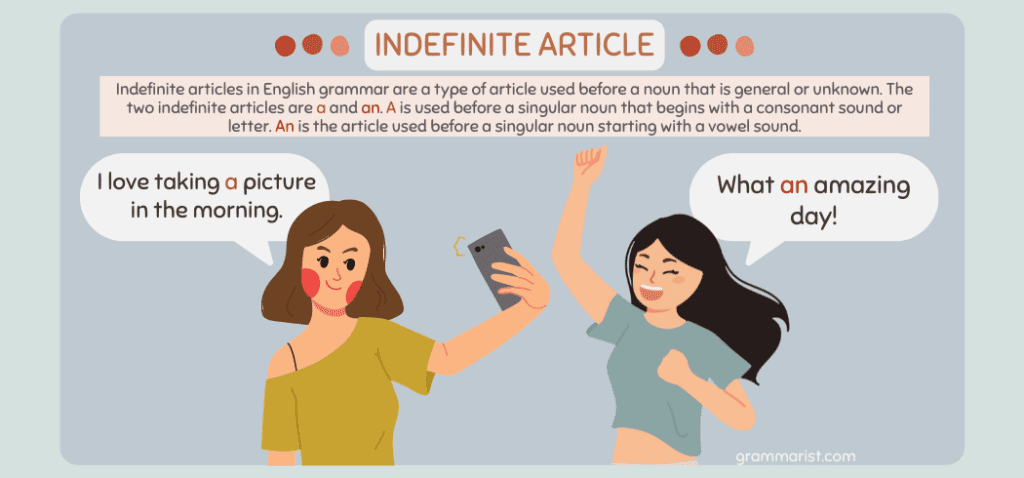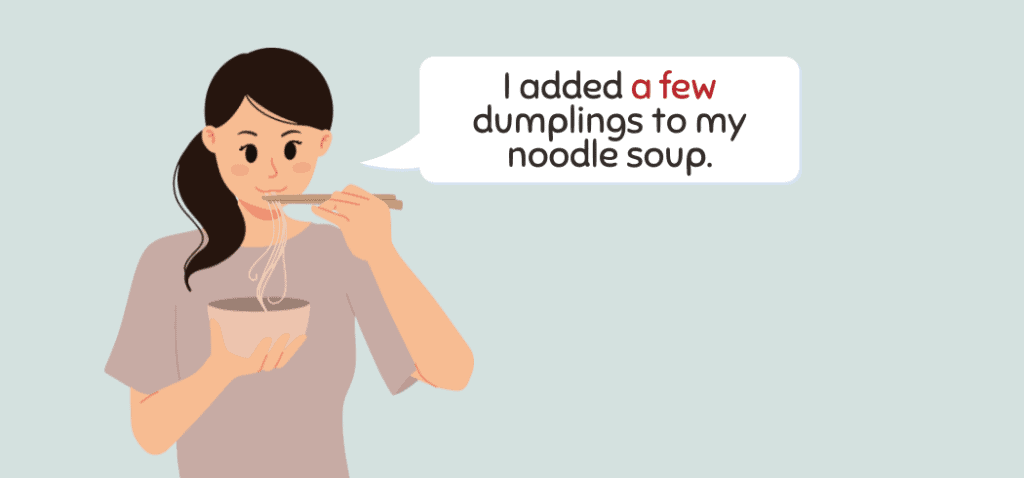Are you confused about indefinite articles and want to improve your grammar? I don’t blame you; I even get them mixed up from time to time. These words (a and an) introduce non-specific, countable, and singular nouns.
Keep reading to learn the definition of indefinite articles and how to use them accurately in your sentences as I go over everything you need to know. I also provided an easy worksheet with answers so you can test your understanding.
What is an Indefinite Article?

Indefinite articles in English grammar are a type of article used before a noun that is general or unknown. Sounds harder than it is, I swear.
An article in the English language is different from a news article. Articles are words used before nouns or noun equivalents. These words act as adjectives because they modify these nouns and noun equivalents.
Unlike the indefinite article, a definite article indicates that the noun’s identity is known to the reader.
What are the Indefinite Articles?
The two indefinite articles are a and an. A is used before a singular noun that begins with a consonant sound or letter. An is the article used before a singular noun starting with a vowel sound.
Here, I made some examples to better explain:
- An apple a day keeps the doctor away
- A kiss will remove the pain.
Rules for Using Indefinite Articles
Hold tight; I’ll show you the correct ways to use indefinite articles.
Indefinite Articles for Countable Nouns
Use the indefinite article for countable nouns when it is singular and has a vowel sound or letter. For example:
- An airplane flew over our house.
- She was holding a book.
In the first sentence, an modifies a countable noun with a vowel sound, airplane. But in the second sentence, a modifies the countable noun with a consonant sound, book. Both airplane and book are unspecified or unknown to the readers.
Do not use indefinite articles for plural countable nouns and uncountable nouns. For example:
- Incorrect: A vocabulary words were given by the teacher to prepare the students.
Correct: The vocabulary words were given by the teacher to prepare the students.
In this sentence I made, vocabulary words is a plural countable noun. It requires the use of the definite article the for accuracy. Below is another example.
- Incorrect: She gave me a water.
Correct: She gave me water.
Water is an uncountable noun, so you don’t need to use an article before it. In some cases, we use the for uncountable nouns to refer to specific objects, groups, and ideas.
Other uncountable nouns that do not require indefinite articles before them are:
- Some foods and drinks like beef, bread, candy, celery, cereal, cheese, chocolate, flour, ice cream, lettuce, milk, pasta, salt, and water.
- Non-food substances like cement, coal, dirt, paper, rain, air, silver, snow, steel, wool, and wood.
- Languages like Russian, Filipino, English, Chinese, French, and Spanish.
- Areas of study like history, math, and biology.
- Others like equipment, clothing, furniture, jewelry, homework, luggage, lumber, machinery, mail, money, and work.
Indefinite Articles with Little and Few

Little and few are adverbs of quantity used for different types of nouns. Few is for countable nouns, while little is for uncountable nouns. I’ll explain futher.
When we use these words without indefinite articles, they have negative meanings. But with indefinite articles, they have positive connotations. For example:
- I have few friends in this city, and I feel sad.
- I have a few friends in this city, so it’s been bearable.
Specific Identity Known
Once you use the indefinite article to mention an unknown noun, you can use the in the following sentence because it’s already been mentioned. For example:
- I ate a cookie last night. The cookie was chewy and chunky.
Do not Use Demonstrative Adjectives to Replace Indefinite Articles
Demonstrative adjectives only replace the definite article the. That’s because this, those, that, and these all point to specific objects. For example:
- This phone is mine.
Incorrect: A phone is mine.
Correct: The phone is mine.
- That tray is full of sweets.
Incorrect: A tray is full of sweets.
Correct: The tray is full of sweets.
Do Not Use Possessive Adjectives to Replace Indefinite Articles
The same rule about demonstrative adjectives applies to possessive adjectives my, your, his, her, its, out, their. That’s because they show ownership of a specific object. For example:
- Her phone has been buzzing since morning.
Incorrect: A phone has been buzzing since morning.
Correct: The phone has been buzzing since morning.
- Our clothes were too small.
Incorrect: A clothes were too small.
Correct: The clothes were too small.
Do Not Use Indefinite Articles for All Things
Do not use an article with all things or things in general. You should also not use indefinite articles with plural count nouns or any uncountable noun that means all. For example:
- Incorrect: A tree is beautiful in the Spring.
Correct: Trees are beautiful in the Spring
Correct: All trees are beautiful in the Spring.
- Incorrect: I do not like a milk.
Correct: I do not like milk.
Correct: I do not like all milk in general.
- Incorrect: I want to ask for an advice.
Correct: I want to ask for advice.
Job Titles
Many people have trouble using uppercase or lowercase letters for job titles like president and judge. Sometimes, we resort to giving these terms capital letters because they seem important.
But if the job title has an indefinite article an and a before it, it’s not used as a proper noun. Instead, it functions as a common noun in the sentence and requires a lowercase letter. For example:
- Incorrect: A Prime Minister is a leader of the government of a country that is a constitutional monarchy, republic, or another system of government.
Correct: A prime minister is a leader of the government of a country that is a constitutional monarchy, republic, or another system of government.
- Incorrect: A Prime Minister said his occupation is daunting
Correct: The Prime Minister said his occupation is daunting.
Plural Form of Indefinite Articles
Both a and an refer to singular nouns and noun equivalents. Unlike the definite article the, a and an have no plural article counterparts. Instead, we use the determiner some.
Some indicates an unknown, limited amount. The only thing we know about the noun is that it’s more than one. For example, an apple becomes some apples. A table becomes some tables. Below are a pair of sentence examples.
- A leaf fell from the tree.
Some leaves fell from the tree.
Indefinite articles A and An Exceptions
The articles a and an are always for singular nouns. But a is not always used for consonant letters. And an isn’t always for vowel letters.
For instance, you need to be careful of acronyms because they are often pronounced as separate letters. That means the starting letter doesn’t always have the same sound. Consider the phrases below.
- A UN ambassador. (UN is pronounced as yoo-uhn.)
- An FBI agent. (FBI is pronounced as ef-bee-ahy.)
Indefinite Articles in a Sentence
Here are more indefinite articles examples in sentences.
- We had a little wine after eating dinner.
- A new doctor came in to check in on me.
- A director will give you advice on your acting.
- They gave me an envelope full of documents.
- Beth had a unique opportunity to meet the CEO.
Is “The” an Indefinite Article?
The is not an indefinite article. It’s a definite article that indicates the known identity of a noun or noun equivalent.
French Indefinite Articles
French articles have similar meanings. Their indefinite articles also indicate that the speaker refers to an unknown noun. The three French indefinite articles are un, une, and des.
But for definite articles, the prepositions à or de and article contract into one word. The French language also includes another category of articles called partitive articles.
Remember that French articles are gendered. For example, we use la or une for a feminine noun and un and le for a masculine noun.
Learn More About English Articles
Indefinite articles a and an are kinds of articles that refer to a singular item with an unknown quantity. You can also use it for job titles as common nouns and with the determiners little and few for positive sentences.
Understanding articles will help you create more precise and accurate sentences. Learn all about the other type of article known as the definite article.